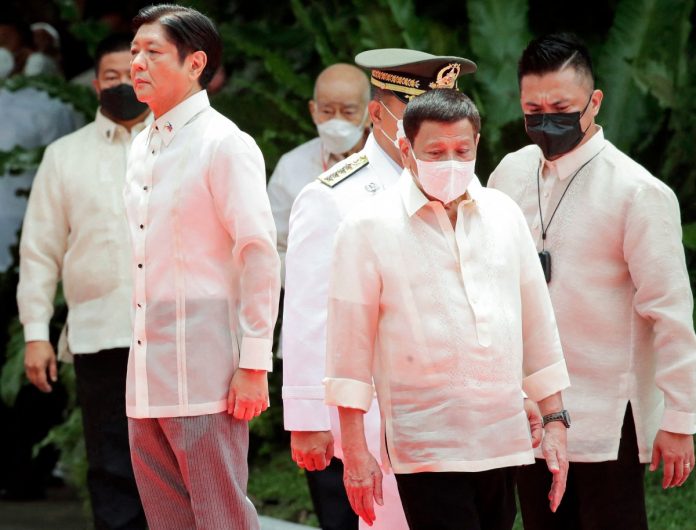Less than two years after Philippine President Ferdinand Marcos was swept to power, his family’s alliance with his firebrand predecessor Rodrigo Duterte has been shattered.
Accusations of drug abuse, threats to split the country and rumours of a coup plot have destroyed the public facade of unity between the Marcos and Duterte families, which joined forces for the 2022 elections.
Philippine politics has long been a family business with elite clans ruling the country, holding onto positions for generations by dishing out favours, buying votes or resorting to violence.
Families often form alliances of convenience with others to win and maintain power — but those relationships can sour when political ambitions collide or promises are not kept.
Marcos, the son and namesake of the country’s former dictator, won the presidency by a landslide following a massive social media misinformation campaign whitewashing his family’s history.
His vice presidential running mate Sara Duterte, the daughter of the former president, helped him win vital support from her family’s home island of Mindanao.
The Marcos and Duterte clans were widely expected to fall out eventually as they began to shore up their rival support bases and secure key positions ahead of the mid-term elections in 2025 and presidential elections in 2028.
But few observers predicted that it would happen so soon or so spectacularly.
‘Drug addict’
Fronting a rally of supporters in his home city Davao on January 28, Duterte accused Marcos of being a “drug addict”, while his youngest son Sebastian Duterte said Marcos should resign.
Marcos hit back the next day, claiming that his predecessor’s long-term use of the powerful opioid fentanyl had taken a toll on his health.
Neither man provided evidence of the other’s alleged drug use.
The mudslinging appeared to be triggered by Marcos’s support for a campaign to change the country’s constitution — introduced after his father was ousted from power in 1986 by a military-backed revolt — which the Dutertes oppose.
Marcos has said he is open to adjusting economic provisions of the constitution to allow in more foreign investment, but critics have warned the move could pave the way for him to extend his time in power.
Analysts said Duterte was also worried that his daughter had been sidelined by the administration and that Marcos could allow the International Criminal Court into the Philippines to investigate his drug war, which killed thousands of people.
The situation escalated last week as Duterte called for Mindanao to secede from the rest of the archipelago nation, prompting some local politicians to warn he risked being charged with sedition.
Top security officials quickly sought to quash any separatist movement, with National Security Adviser Eduardo Ano saying the government would use “its authority and forces to quell and stop any and all attempts to dismember the Republic.”
‘Despicable treatment’
Armed Forces of the Philippines chief General Romeo Brawner spent last weekend visiting military bases in Mindanao, urging troops to be loyal to “our duly constituted authorities”.
The visit came after a series of rumours reported in local media — denied by authorities — of a plot to remove Marcos from power.
Calling for secession sends “a strong message to the president that he has not been treating the members of the Duterte family very well,” University of Santo Tomas political science professor Dennis Coronacion told AFP.
Cracks in the relationship began to emerge early in Marcos’s term after he denied Sara Duterte her preferred position of defence secretary and instead gave her the problem-plagued education portfolio.
Marcos also sought to repair ties with the Philippines’ traditional ally Washington after relations frayed under Duterte, who was friendly towards China.
In November, Marcos said the possibility of rejoining the ICC was “under study”, more than four years after Duterte withdrew the country from The Hague-based court as it began probing his drug war.
But Marcos insisted last month that the government would not cooperate with the ICC investigation.
While Sara Duterte alleged last week that she had suffered “despicable treatment” by people close to the president, she has been careful to avoid directly criticising Marcos.
Despite the elder Duterte’s attacks on his successor, Marcos has said his relationship with Sara Duterte remains unchanged and that he would keep her as education secretary.
Another key player in the ongoing family melodrama is Marcos’s cousin Martin Romualdez, who holds the powerful position of speaker in the House of Representatives.
He is widely expected to seek the presidency in 2028, potentially pitting him against the more popular Sara Duterte.
Romualdez has earned the ire of the Dutertes by spearheading efforts to strip the vice presidency and the education department of millions of dollars in special confidential funds last year.
And the House, where Marcos has a majority of support, has pushed for a pro-Duterte radio and television broadcaster to be stripped of its licence after one of its hosts made accusations against Romualdez over his travel budget.









